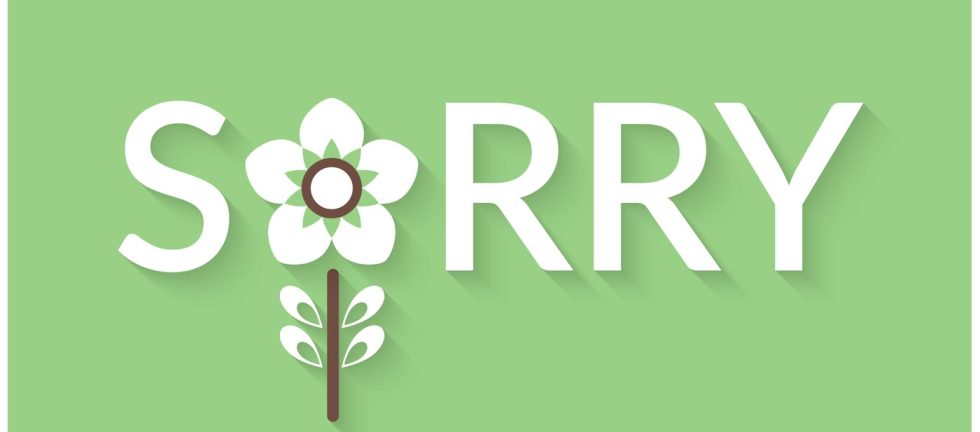Welcome to the Fork in the Road Blog: Reflections on Life, musings based on my perception of life spanning decades of active life. This episode – Sorry and thank you –muses over apologizing and expressing appreciation– saying “Sorry” and “thank you”.
Apologetic, contrite, penitent, regretful, remorseful, repentant, repenting, rueful. All these are synonyms of Sorry. A short, two syllable, word but extremely powerful. It can disarm a Goliath in full armour and ready for a fight.
Sorry can be a genuine expression of remorsefulness, but it can also be a polite way of saying “There is nothing in the argument or accusation. Let it rest. Let us move on. Let us not waste time on this meaningless exchange.” Which of these two meanings is meant when one says “Sorry” depends on the tone in which the word is said. There is a difference between:
“Okeeee sorry” and
“I am very (or really) sorry”
In both expressions, the operative word is “sorry” but the way it is packaged is what gives it the intended meaning.
In my book Fork in the road, I encourage the reader to work on saying “Thank you” and “Sorry” effortlessly. I point out that those three words would help you to overlook small things and keep you focused on the road and the legacy you are creating.
I know people who never apologize, who never say “sorry” irrespective of how much they are in the wrong. These people are good at the “blaming game”. They are ready to blame someone or some people for the mistake but never blame themselves. They blame others to hide the embarrassment of the egg all over their face for what they would have done. These are social weaklings however powerful they may be. We see these blaming games played by national leaders all over the world. When the game is played close at home it is sometimes stomach wrenching.
Others are the equivalent to pathological liars. They cannot accept that they can be wrong. The word “sorry” is not in their vocabulary. They genuinely do not understand what it means because they never use it and yet, normally, it is difficult to go through 24 hours without having been in a situation where the word “sorry” could or should have been used in one’s hearing. Such people are arrogant. They feel above, what they see as, the “grovelling” life of apologizers.
It is better to apologize when you do not even know what you are apologizing for, than not to, when you should have done so. You can always put a caveat to the apology with a “but”: “I am sorry, but ….” and elaborate why either you are not fully to blame, or even how the person or people you are apologizing to are to blame. The tactic works and defuses unwanted situations.
Appreciations, gratefulness, gratitude, thankfulness, thanks are expressions of positive acknowledgement of “services” provided. We are taught from early childhood, with proper upbringing, to say “thank you” when we are given something by anybody.
Religions preach giving thanks to the deity, not only for life but for daily offerings such as food, water, rain and sunshine, family, and friends. How often do we say: “Thank God” when we receive good news or when a problem is solved, or an issue is resolved? While this is in the category of expressing “thanks” it is not the “Thank you” I am focusing on here. I am talking of genuine expression of appreciation to the person who has contributed something to you. That “something” can be tangible (a gift), verbal (a compliment) or supportive (in time of need). It is different from the knee jerk expression of “Thank God”. I do not think even God acknowledges this as a heart-felt appreciation of whatever He would have done.
A “thank you” can soften the blow of a criticism. For example, in a work environment if you requested for a report to be done by people you supervise and they give it to you on time, but find that it is below expectations, there is no harm in separating the delivery of the report on time and its contents. The fact that the report was delivered on time deserves a “thank you”. You can then proceed with a “but” regarding the contents pointing out the shortfalls. The “thank you” would have placed the person delivering the report in a compliant state, ready to listen to the comments on the contents of the report, and it would have held you back from an explosive reaction.
My wife and I have a few people working for us: a housekeeper, a gardener, a driver and five regular farm workers. All of us behave and interact with each other as a family. A family that respects each member’s contribution. We never tire thanking them for whatever they do, however small a task may be. When we must point out shortfalls in any of their performance, they readily accept our comments without rancour because they know that we notice the good things they do and acknowledge them.
Persons who readily say “thank you” in appreciation of a gift, a compliment or support in time of need, are more likely to acknowledge their mistakes and apologize. It is also a sign of self-confidence and humility.
Work on saying “Sorry” and “Thank you” and you will be surprised of the benefits you will reap.
Thank you for being part of the Fork in the Road Blogs: Reflections on Life. Be sure to look out for the next episode when I will be writing about Friendship. And if you gathered something useful, please feel free to share the blog. My book, Fork in the Road: Creating a future of value starting from where you are is available for purchase at Aristoc bookshops in Kampala and online at Amazon and look out for my upcoming book: A view round the bend. Setting goals for your life’s journey.


Comments (2)
MNL
Three very simple words that can make a huge difference indeed
Rtn Stephen
Absolutely but how many times do we forget to use them!